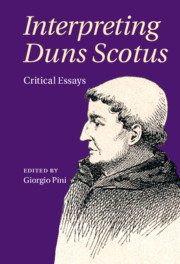Book contents
- Interpreting Duns Scotus
- Interpreting Duns Scotus
- Copyright page
- Contents
- Acknowledgments
- Notes on contributors
- Introduction
- Chapter 1 John Duns Scotus’s life in context
- Chapter 2 The modal framework of Duns Scotus’s argument for the existence of a first cause
- Chapter 3 Duns Scotus on essential order in De Primo Principio and elsewhere
- Chapter 4 Duns Scotus on how God causes the created will’s volitions
- Chapter 5 Duns Scotus on free will and human agency
- Chapter 6 Duns Scotus on the dignities of human nature
- Chapter 7 Duns Scotus on matter and form
- Chapter 8 Duns Scotus, intuitionism, and the third sense of ‘natural law’
- Chapter 9 The bounds of sense: adequacy and abstraction in the later works of Duns Scotus
- Chapter 10 Before univocity: Duns Scotus’s rejection of analogy
- Chapter 11 Analogy after Duns Scotus: the role of the analogia entis in the Scotist metaphysics at Barcelona, 1320–1330
- Bibliography
- Index
Chapter 2 - The modal framework of Duns Scotus’s argument for the existence of a first cause
Published online by Cambridge University Press: 23 December 2021
- Interpreting Duns Scotus
- Interpreting Duns Scotus
- Copyright page
- Contents
- Acknowledgments
- Notes on contributors
- Introduction
- Chapter 1 John Duns Scotus’s life in context
- Chapter 2 The modal framework of Duns Scotus’s argument for the existence of a first cause
- Chapter 3 Duns Scotus on essential order in De Primo Principio and elsewhere
- Chapter 4 Duns Scotus on how God causes the created will’s volitions
- Chapter 5 Duns Scotus on free will and human agency
- Chapter 6 Duns Scotus on the dignities of human nature
- Chapter 7 Duns Scotus on matter and form
- Chapter 8 Duns Scotus, intuitionism, and the third sense of ‘natural law’
- Chapter 9 The bounds of sense: adequacy and abstraction in the later works of Duns Scotus
- Chapter 10 Before univocity: Duns Scotus’s rejection of analogy
- Chapter 11 Analogy after Duns Scotus: the role of the analogia entis in the Scotist metaphysics at Barcelona, 1320–1330
- Bibliography
- Index
Summary
This essay examines Duns Scotus’s celebrated modal argument for the existence of a first cause in the light of his most extensive discussion of modality: namely, the account of the senses of ‘potency’ in his questions on Aristotle’s Metaphysics, book IX, qq. 1–2. The author holds that it is possible to give two alternative reconstructions of Duns Scotus’s argument for the existence of a first cause depending on which of two alternative interpretations is given to the term ‘potency’. First, ‘potency’ can be taken as what is metaphysically possible. In this interpretation, the potential is co-extensive with ‘being’. Second, ‘potency’ can be taken to mean what is opposed to the actual. In this second interpretation, being in potency is a kind of non-being. The conclusion is that, contrary to what might first appear, it is the second interpretation of ‘potency’ that should be preferred if we want Duns Scotus’s argument for the existence of a first cause to work.
Keywords
- Type
- Chapter
- Information
- Interpreting Duns ScotusCritical Essays, pp. 44 - 58Publisher: Cambridge University PressPrint publication year: 2022

